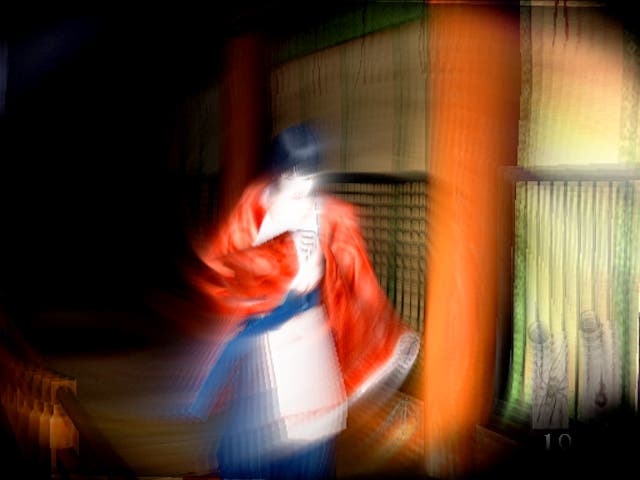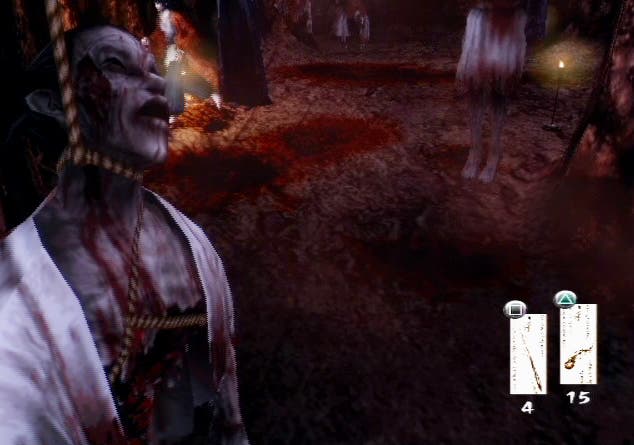Kuon
You know you want to...
Onimusha might well represent the most successful foray made by any game into the surreal world of traditional Japanese Kwaidan storytelling. However, behind every favourite there tends to be an underdog, a role Kuon quietly adopts. It's a position that would take a great deal of work to escape.
But let's not get ahead of ourselves. FromSoftware's Kuon is a tale of intrigue, the occult and awkward priestesses in feudal Japan. Players are pitted against a cast of supernatural monsters including Gaki (loveable rogues, with no more desire than to eat the flesh of vaguely more human characters), ghosts, deformed people and some other things that are neither inspired nor surprising. Bored yet? Give it five minutes.
Survival Horror
If ever there was space in this world for a game more confused about its genre than most of us are about Nintendo's naming decisions, then Kuon has more than filled that particular void. At every step Kuon oozes survival horror appeal, but it's important to point out that it doesn't deliver in the same way as the rest of its genre. No, survival horror is the way it is now because it's flawed and Kuon irons out all of those teething problems without batting an eye.
The first port of call in Kuon's revolutionary rewriting of accepted genre rules is the word "survival" itself. Under normal survival horror circumstances players struggle to stay alive - it makes sense, it's easy and there's nobody who can't grasp it quickly. In Kuon, on the other hand, the challenge is in not dying. It's a small but monumental difference.
While horror classics like Resident Evil and Silent Hill aim to keep us on the edge of our seats, life slowly trickling away and sweat oozing from every pore, Kuon adds events that amount to instant death, stunningly awkward but unavoidable combat and character disabilities that border on the comedic. Of course we're used to our characters having specific capabilities and inabilities (jumping, anyone?), but there is such a thing as going too far.
Kuon even inexplicably adds the ability to jump later in the game... though only when you really need to. By the way, I hope you don't like saving too often, because it isn't supportive of that kind of filthy attitude either.
Puzzle it Out

Kuon features two primary characters, with the game playable from either point of view as the Ying Phase or the Yang Phase. Don't worry though; the biggest difference is that one is more sexually ambiguous than the other.
Utsuki, daughter of a priest and sister to the one who gets lost at the beginning (there's always one) is the star of the Ying Phase. She's awkward, ungainly and just like everyone else, her lips don't move when she speaks. Though this is a nice time to point out that there's an option to play in Japanese with subtitles, which is nice.
By contrast, our more tomboyish playable character takes the form of Sakuya who comes with more spells and summons out of the box but is no more useful and no less painstaking to manoeuvre.
Playing through one phase won't earn you an ending though; to manage that you'll need to play through the entire mess again in the other phase, to facilitate unlocking an actual ending at some stage (through the "Kuon phase"). The experience is painful in the extreme; given that the majority of the game is near enough the same in either cycle, the initial, "Wow, I played this with the other lass," value falls into the abyss of, "I've already played this... with that other hosebeast..."
Despite having played through the puzzles before, they won't fail to frustrate. Kuon features just the sorts of puzzles we know and love. You know the kind... have you collected all eight of the mystic placemats? Non? Backtrack for the next hour and a half looking for a telltale sparkle then, because proceed you will not.
Of course, those are the puzzles closest to having a basis in reality. Some are seemingly arbitrary jumbles that defy any attempt at explanation. It's not a question of difficulty; it's a question of sense and the lack thereof.
Loco-motion

While horror games usually set players up with limited weapons, ammunition and life, Kuon's approach is slightly different. Rather than have attacking foes that might be better off avoided teach players the finer points of survival economics, the idea seems to have been to make any movement teach a valuable lesson in playtime economics (secret hint, if you're playing you're probably misspending).
Save time by running? There's a phenomenal idea. Sadly, running tires out your pathetic human character, this in turn leads to the onset of "vertigo" and screen blurring effects that will further impede your already faltering control over your character. Running also attracts more enemies to the already grail-shaped beacon that constitutes our protagonist. This in turn leads to actually fighting... joy.
"Watch out, monster! No wait, it's a monkey... no, it's a man who looks like a monkey!" or so the girlfriend declares. Fortunately, I'm saved by my frustrating knife thing.
Melee fighting in Kuon consists of mercilessly pressing square, and finishing that combo by pressing square again, just as mercilessly. There are no more attacks with a melee weapon, so that's about the size of it. Fortunately it comes with a large enough recovery time to get us hit, or grabbed in the case of Gaki, unavoidably. Unfortunately for them, pressing square pushes them off, with no harm done. It's like that time I went to that bar...
Spell cards can be collected and either act as attacks or summon creatures to do the attacking for you. Either way, casting, despite being hot-keyed to a single face button, is just like everything else - a process so slow as to be detrimental. To properly take advantage of having a projectile it's necessary to be far enough away not to be attacked. Since just turning around takes an age, you'll be lumbering about until whatever you ran from catches up and attacks you... which just about sums up the whole game really.
Fudge Factor
Overall, despite the admittedly sloppy combat, Kuon manages miraculously to be even less than the sum of all its parts, diminishing and lowering the playability of the game as a whole.
Anyone who has ever left the dishwasher off for about a week while adding to it continuously will know that, regardless of how good everything that entered was, the whole thing smells like sick in the end. That's the level of wretchedness that Kuon brings upon itself; it doesn't matter that the chicken/puzzling was good. We're not going to eat/play it now that it's joined the writhing mass we're presented with.
It's a good looking game, but any amount of prolonged play makes it apparent that it's just a kind of sad "creepy by numbers" approach. It even goes so far as to include the obligatory "whispery songs by creepy children". We can only imagine the kind of meeting that preceded their inclusion...
"Man, this is one dreadful game... What if we put in some of those creepy singing kids?"
